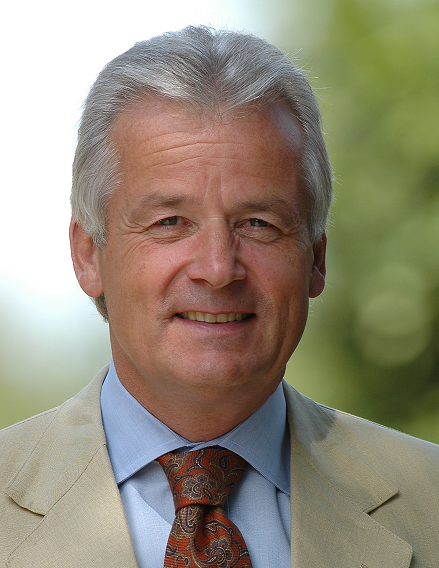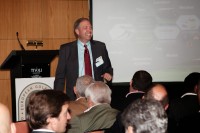Golf Inc. Fall 2013: article by Trevor Ledger
Earlier this year an historic meeting took place between senior European Union (EU) representatives and stakeholders from the golf industry – the first such meeting ever. One of the stakeholders present was the European Golf Course Owners Association (EGCOA) and in an exclusive interview with Golf Inc. the EGCOA President, Sacha Baron von Spoercken, explained the importance of getting the EU ‘on board’ in order for golf to flourish across Europe.
“In Brussels we presented a unified industry and concentrated on the economic, social and environmental importance of golf to the countries of Europe.” The initial response from the EU mandarins was surprising to von Spoercken: “Nobody in Brussels knew that the financial contribution of golf across the EU is in the region of 15 billion Euros and that it employs in excess of 400,000 people. They thought it was a small and somewhat eccentric industry so we made a good first step by emphasising the economic and social impact golf has across the entire region.” However, von Spoercken is under no illusion as to the task that lies ahead of the golf industry in general and the EGCOA in particular. On the question of formulating and implementing EU directives that might hold power over all of Europe’s golf federations, he was blunt: “Such change will happen over decades if not longer! But we have definitely made inroads, the train has left the station as it were.”
The complex nature of EU policy making – infamous for extraordinarily expensive and long-winded bureaucracy – is perhaps more understandable when considering the wildly differing economic and social experiences of the member countries. Such diversity is apparent in the golf industry and von Spoercken recognises the difficulties of umbrella statements. “You have to look at golf country by country” he said, “some are experiencing growth, some are stable and some are declining. In Eastern Europe – Poland and the Czech Republic for example – the situation is very healthy, the same in Finland but more mature markets like Sweden and the UK have slowed down considerably. Overall though there is a definite slow-down and it is possible to say that this has become more pronounced over the last couple of years.”
The challenges facing golf in Europe are both generic and individual: changed consumer behaviour and the lingering perception of golf as an elitist sport coupled with an overall reduction in disposable income being the familiar story the world over. Sacha von Spoercken again warned that in Europe the individual countries needed to be analysed individually as the situation in each has marked differences but was able to pinpoint particular areas where similar situations arose more or less across the board. “In many countries across Europe there is a very strong, traditional golf element that is protected by the national federations and this is doing little to help promote the growth of golf. Protecting old, established clubs which are run as non-profit organisations is a situation that has evolved over a long period of time whereas commercial golf operations [the facilities represented by the EGCOA] are comparatively new and have often only been in business for the past 25-30 years.
“The situation in Germany, for example, sees golf as a very regulated sport: all golfers must belong to a golf club and each club must be a member of the national federation [Deutsche Golf Verband (DGV)]. The DGV then limits the number of golfers artificially!”
While the individual federations operate under such apparently prejudiced conditions, von Spoercken recognises that unity is strength. “We are trying to get around this monopoly and it will take a while to be able to compete with them. But we do not want to confront them at all, we want to co-operate and collaborate. All stakeholders in the golf industry must work together – it is very, very important to try to convince the federations that there is a new development in golf which is different to the traditional, non-profit members’ clubs. It is these new developments, commercial golf operations, that allow for real growth of participation, for growth of golf.
“Of course non-profit organisations are a completely legitimate exercise – not just in golf but in anything – but they cannot be allowed to operate a monopoly; a competitive disadvantage should not be allowed to exist. For example look at Value Added Tax (VAT): the situation [whereby private members clubs get significant tax breaks not enjoyed by commercial outfits] is grossly unfair and it is this sort of area in which progress is being made.”
The advance being made by the EGCOA and its constituent bodies across Europe can perhaps be measured by the burgeoning membership: from its inception just eight years ago, the association now represents more than 1000 courses across 13 countries – representing more than a 30% market share. In representing the interests of golf course owners the EGCOA is, by logical conclusion, actively promoting the growth of golf – the market within which member profits can be made. Sacha von Spoercken has clear intentions in this regard: “We want to increase the professionalism in the golf club industry. Up to now it has largely been run by amateurs – that is not to criticise amateurs who have, for a long time, run the traditional non-profit clubs. But commercial organisations (the vast majority of new developments across Europe) need to be run by professionals.”
It is important that the EGCOA’s activities are not seen as merely self-interested: von Spoercken emphasised that their next big step is to reverse the trends of growth slowdown by removing barriers that are holding golf back. He said: “We all need healthy growth, commercial and non-profit clubs alike and to do that we need to intensify the lobby action that is already going on. We need to work together to provide more nine, six and even three-hole facilities where time restrictions are not a barrier to playing golf. We also need to change the rules and regulations – not dramatically, just a little – while taking care not to betray the spirit and traditions of this wonderful sport.”
In essence Sacha von Spoercken is a man with a passion for golf and recognises that ‘the strength of the wolf is in the pack’. United, he believes, the golf club industry has a strong future and he recognises that as being beneficial to all. Yet while his shrewd business sense is readily evident, his love for the game and genuine wish to open it up to a wider audience comes across even stronger: “Our primary mission statement would be to promote and grow the game of golf; it is such a wonderful sport and more people deserve the right to play.”







